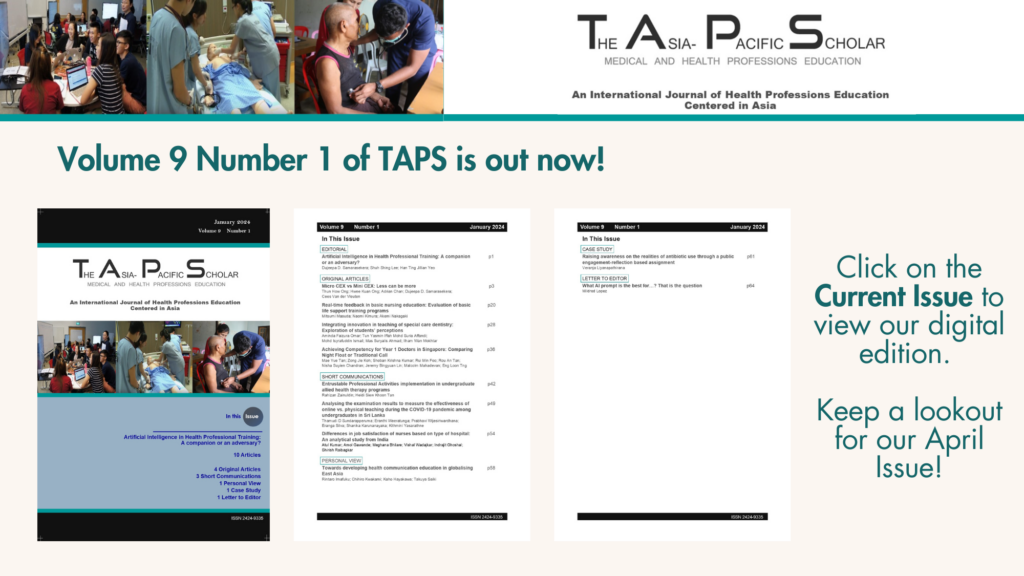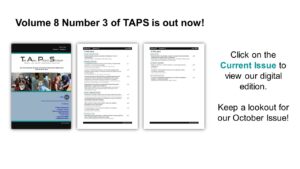Learning humanistic values in Nepal
Submitted: 15 March 2022
Accepted: 23 March 2022
Published online: 5 July, TAPS 2022, 7(3), 63-64
https://doi.org/10.29060/TAPS.2022-7-3/LE2777
P Ravi Shankar
IMU Centre for Education, International Medical University, Malaysia
I read with great interest the article titled ‘Humanism in Asian medical education – A scoping review’ (Zhu et al., 2021). The article provides an overview of the teaching of humanism in medical schools in Asia. Teaching humanistic values is still not common among Asian medical schools and the published literature is predominantly from a few countries.
The Himalayan country of Nepal has also taken initiatives to strengthen the learning of humanistic values by medical students.
Initiatives have been conducted at different institutions including KIST Medical College, Lalitpur, Nepal, and Patan Academy of Health Sciences (PAHS), Lalitpur, Nepal among others. I believe that the medical humanities can play an important role in fostering humanistic values among medical students. An overview of the discipline in Nepal was provided in an article published in 2014 (Dhakal et al., 2014). Recently several initiatives are being undertaken at PAHS and the undergraduate medical program at the institution has the objective of creating doctors for rural Nepal.
I do agree that there have been problems with the sustainability of these initiatives in Nepal. The language of medical education in Nepal is English like in many other Asian countries. However, the activities and material used were adapted to the Nepalese context, where possible. The scoping review about humanism in Asian medical education can be made more comprehensive by including the initiatives and publications from Nepal, a country where despite various challenges, initiatives have been undertaken in this important area. These studies do fit into the core characteristics of the Integrity, Excellence, Compassion & Collaboration, Altruism, Respect & Resilience, Empathy, and Service (IECARES) framework used by the authors.
The immediate and short-term impacts of these initiatives have been published and the medium-term impact has been studied and is under review for publication. The challenge with measuring the medium to long-term impact of these initiatives is the possibility of other activities undertaken by the student also influencing the outcomes and introducing bias. A variety of methods have been used to foster teaching-learning of humanistic values. Though there are limitations as mentioned earlier, the addition of these initiatives may add strength and greater representativeness to the scoping review.
Note on Contributor
Dr Shankar was involved in conceptualising writing, and editing the manuscript.
Funding
No funds, grants, or other support were received.
Declaration of Interest
No conflicts of interest are associated with this paper.
References
Dhakal, A. K., Shankar, P. R., Dhakal, S., Shrestha, D., & Piryani, R. M. (2014). Medical humanities in Nepal: Present scenario. Journal of the Nepal Medical Association, 52(193), 751–754.
Zhu, C. S., Yap, R. K. F., Lim, S. Y. S., Toh, Y. P., & Loh, V. W. K. (2021). Humanism in Asian medical education – A scoping review. The Asia Pacific Scholar, 7(1), 9-20. https://doi.org/10.29060/TAPS.2022-7-1/RA2460
*P Ravi Shankar
International Medical University,
Bukit Jalil, Kuala Lumpur, Malaysia
Email: ravi.dr.shankar@gmail.com
Announcements
- Best Reviewer Awards 2024
TAPS would like to express gratitude and thanks to an extraordinary group of reviewers who are awarded the Best Reviewer Awards for 2024.
Refer here for the list of recipients. - Most Accessed Article 2024
The Most Accessed Article of 2024 goes to Persons with Disabilities (PWD) as patient educators: Effects on medical student attitudes.
Congratulations, Dr Vivien Lee and co-authors! - Best Article Award 2024
The Best Article Award of 2024 goes to Achieving Competency for Year 1 Doctors in Singapore: Comparing Night Float or Traditional Call.
Congratulations, Dr Tan Mae Yue and co-authors! - Fourth Thematic Issue: Call for Submissions
The Asia Pacific Scholar is now calling for submissions for its Fourth Thematic Publication on “Developing a Holistic Healthcare Practitioner for a Sustainable Future”!
The Guest Editors for this Thematic Issue are A/Prof Marcus Henning and Adj A/Prof Mabel Yap. For more information on paper submissions, check out here! - Best Reviewer Awards 2023
TAPS would like to express gratitude and thanks to an extraordinary group of reviewers who are awarded the Best Reviewer Awards for 2023.
Refer here for the list of recipients. - Most Accessed Article 2023
The Most Accessed Article of 2023 goes to Small, sustainable, steps to success as a scholar in Health Professions Education – Micro (macro and meta) matters.
Congratulations, A/Prof Goh Poh-Sun & Dr Elisabeth Schlegel! - Best Article Award 2023
The Best Article Award of 2023 goes to Increasing the value of Community-Based Education through Interprofessional Education.
Congratulations, Dr Tri Nur Kristina and co-authors! - Volume 9 Number 1 of TAPS is out now! Click on the Current Issue to view our digital edition.

- Best Reviewer Awards 2022
TAPS would like to express gratitude and thanks to an extraordinary group of reviewers who are awarded the Best Reviewer Awards for 2022.
Refer here for the list of recipients. - Most Accessed Article 2022
The Most Accessed Article of 2022 goes to An urgent need to teach complexity science to health science students.
Congratulations, Dr Bhuvan KC and Dr Ravi Shankar. - Best Article Award 2022
The Best Article Award of 2022 goes to From clinician to educator: A scoping review of professional identity and the influence of impostor phenomenon.
Congratulations, Ms Freeman and co-authors. - Volume 8 Number 3 of TAPS is out now! Click on the Current Issue to view our digital edition.

- Best Reviewer Awards 2021
TAPS would like to express gratitude and thanks to an extraordinary group of reviewers who are awarded the Best Reviewer Awards for 2021.
Refer here for the list of recipients. - Most Accessed Article 2021
The Most Accessed Article of 2021 goes to Professional identity formation-oriented mentoring technique as a method to improve self-regulated learning: A mixed-method study.
Congratulations, Assoc/Prof Matsuyama and co-authors. - Best Reviewer Awards 2020
TAPS would like to express gratitude and thanks to an extraordinary group of reviewers who are awarded the Best Reviewer Awards for 2020.
Refer here for the list of recipients. - Most Accessed Article 2020
The Most Accessed Article of 2020 goes to Inter-related issues that impact motivation in biomedical sciences graduate education. Congratulations, Dr Chen Zhi Xiong and co-authors.









